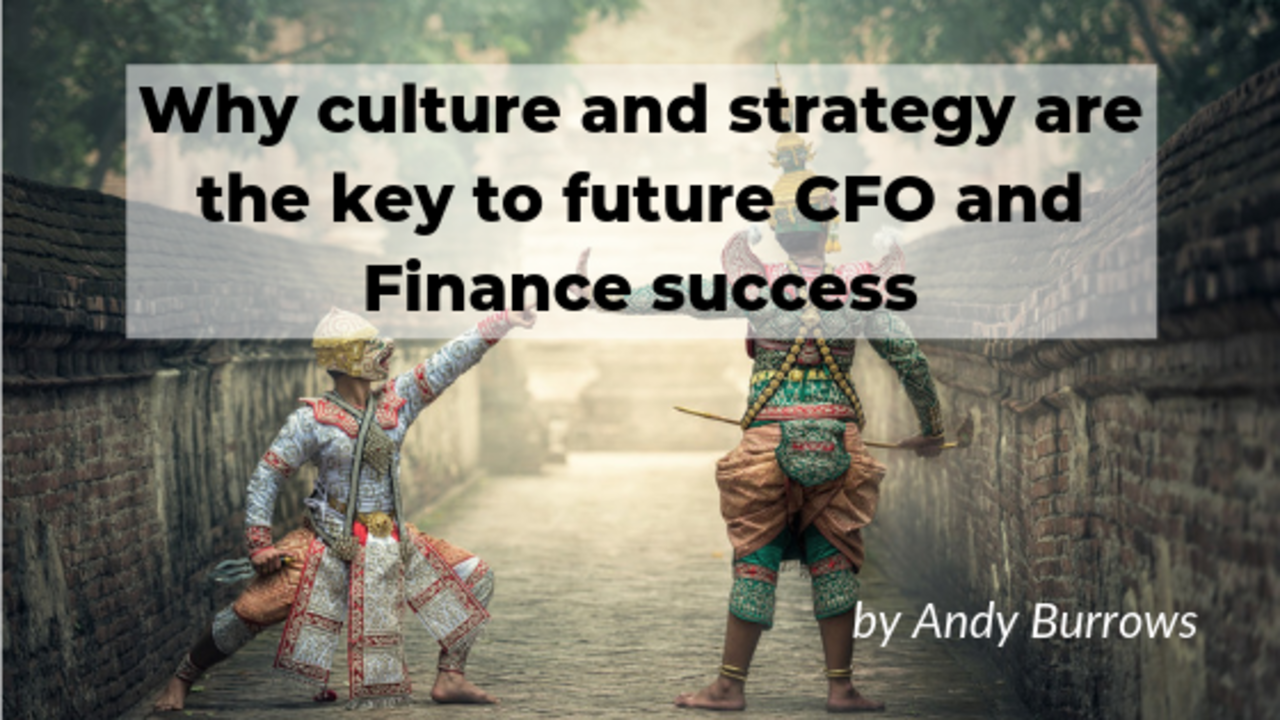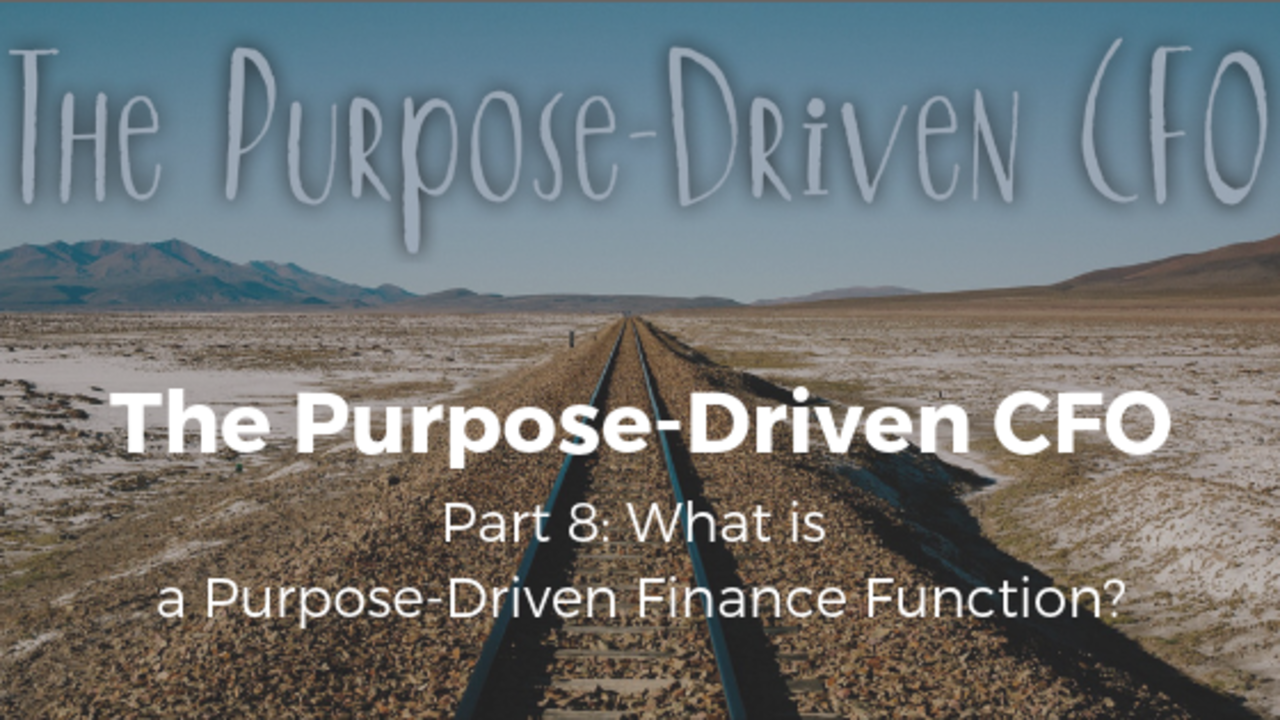Why culture and strategy are the key to future CFO and Finance success

By Andy Burrows
I do quite like that saying (originated by Peter Drucker), “culture eats strategy for breakfast!” I’m not quite sure what it means exactly... but it conjures images of tasty eggs, bacon, sausages, and maybe a couple of slices of toast, so it makes me smile!
But what of culture and/or strategy in the Finance function?
I’m going to argue in this article that Finance is increasingly under pressure to change. Or, more positively, we’re presented with an opportunity we should be reaching for more confidently than we are.
And that’s the opportunity to be involved in business decisions, the opportunity to drive business performance through helping to improve performance management.
The irony is that it’s the CFO who often stands in the way of the Finance fulfilling its potential to help the business and create value. And that’s because the CFO often has cultural blind spots and strategic blind spots.
The drivers of change in the CFO role
The CFO’s role has changed over ...
Is the drive for efficiency actually making Finance any better?

By Andy Burrows
In the generally accepted paradigm for the Finance function, where Finance is an overhead that needs to be kept down and reduced constantly, efficiency is often the name of the game.
And the ways we get efficiency are normally through simplification, standardisation and automation.
Those three words were the mantra of a Finance Transformation programme I once knew. And it’s a great mantra!
We don’t want to be adding layer upon layer of complexity. We don’t need to have multiple ways of doing exactly the same thing. And why would we do something manually when a computer can do it for us?
But…
We need to be careful. There is such a thing as oversimplification. And even as we shave more costs out of the P&L through simplification-driven efficiency, there can be bigger negative impact on overall performance.
Let me explain…
Why Simple Wins… But Not All The Time
In her book, Why Simple Wins, Lisa Bodell talks about what she calls, “internal mindset bias”. This is wh...
Finance transformation without new software or shared services

By Andy Burrows
This article was inspired by a comment someone made a while ago when I was talking recently about innovation within Finance: “Can innovation in finance be as simple as: Put away the spreadsheets! Get off email! And absorb yourself in the business! It seems simple but is it innovative…?”
That struck a chord with me. It would be quite a new and different thing for many Finance people to spend more of their time with the business. It's not what we'd normally class as innovation, but the definition of 'innovation' is just the application of something new to bring about an improvement.
The big question is ‘why?’
The big question is 'why?' What benefit would there be from Finance people spending more time with non-Finance people in the business? Are we saying that there is more value in simple conversations with non-Finance business managers than spending time on the spreadsheets we love (and love to hate)? How can that be?
Many people may respond with frustration, sayin...
How to tell if your Finance function is any good

By Andy Burrows
There are many different ways of looking at the performance of a Finance function.
But in this article, I want to start from first principles and definitions.
As with any question of performance, before you can tell how well you’re doing, you have to know “what good looks like”.
How can we tell if we’re doing a good job if we don’t know what the definition of “good” is?
But don’t, at this point, go straight into thinking about how you’d define a good job in Finance! If you do, you’re jumping the gun!
We need one more definition... the general definition of “doing a good job”.
The general definition of “doing a good job” is that you are meeting your objectives, which in turn is defined as making your anticipated progress towards your ultimate goals.
So, you have to know at the outset what your goals and objectives are.
Most people think that these are so obvious that they skip the thinking here. But it makes such a huge difference. And that lazy thinking is one ...
Don’t make this one mistake in your Finance Transformation

By Andy Burrows
Finance Transformation programmes will often include something like the following line in their business case: “Capacity created by automation and process efficiency will be reinvested in value-adding activity.”
Sounds great, doesn’t it? What could possibly be wrong with that?
Well, as an aspiration, it’s got a lot going for it. The trouble is, no one really believes it and it hardly ever happens. In fact, the opposite often happens. The capacity created is turned into cost savings, which leave even less time for “value-adding” activity than before.
So, if you really want a value-adding Finance function, don’t let your Finance Transformation programme become all about cost savings. And be clearer on how Finance adds value.
Automation is a good thing
First, lest you misunderstand me, let me say that automation and process efficiency are good things.
When I look back on the revolution caused by computerisation 20-30 years ago, I was eager to see how the new technol...
It’s time to take an Amazonian approach to technology in Finance

By Andy Burrows
With all the scare stories about “robots taking our jobs”, it’s easy to get the impression that we’d rather have robots doing jobs because they’re better than us.
Recently, I had to do a 2-minute presentation on the subject of why Finance should pursue automation opportunities. And I was given a PowerPoint slide with 10 or so bullet points full of buzzwords, telling how automation can reduce cost, improve customer satisfaction, improve consistency and traceability, support strategic platform upgrades and accelerate innovation, amongst other things.
Even my own eyes glazed over as I started to talk it through, so I cut to the real point.
Forget the buzzwords!
Forget the buzzwords. Humans are better than robots!
Robots don’t have intelligence.
Robots don’t interpret anything.
Robots don’t take action on information.
Robots don’t make strategies.
Robots don’t care if they win or lose.
Robots do:
Do repeatable, programmable, computer-based tasks…
On time…
Ever...
Thinking Strategically About Finance Transformation

By Andy Burrows
Finance Transformation should be thought of as a strategy. I get the impression that we don’t think of Finance Transformation like that. We tend to think that the business has a strategy, and functions like Finance just do “transformation” programmes.
I’ve argued in the past that, generally speaking, the CFO’s strategic blind spot is the Finance function itself. In another article, I suggested that CFOs are spending too much time business partnering, so that they don’t give enough strategic thought to the Finance function.
So, this article is all about how we can be strategic about Finance Transformation. In fact, as I said at the beginning, it’s more than that. We ought to think of Finance Transformation as the vehicle for Finance function strategy.
Thinking about strategy makes a difference
My definition of strategy is that, “strategy is a plan of action to achieve an aspiration or overcome a problem.” And Finance Transformation is just that.
Well, no one can ar...
Please can we stop saying that the future of Finance is all about RPA and AI! It’s not!

By Andy Burrows
So much ink has been spilled about the impact of technology and automation in Finance – RPA and AI and the like - that it’s starting to get a bit tedious. From reading all this stuff, anyone would think that there’s a robot army lining up to make us all redundant! And it’s written as if it’s at the forefront of everyone’s minds in Finance.
On the ground, in the real world of Finance in real world business, it’s not like that!
And we all know deep down that it’s hype! Who sponsors the conferences and the accountancy publications and the webinars that are spouting this stuff? The software vendors!! There’s a vested interest in inflated claims and understated costs/risks.
And yet it feels like the whole Finance and Accounting industry looks down on you if you’ve never heard of RPA, haven’t got a cloud ERP project planned, or you’re not talking about analytics and predictive modelling.
What we need is a balanced analysis of the issues involved, in order to make an info...
The Future CFO – 4 Ingredients for CFO Success in the Modern Age

By Andy Burrows
[Published 23rd July 2018, edited 20th September 2018]
To be successful the future CFO will need to be all about mindsets and methodologies.
My presentation at the AICPA-CIMA Finance Transformation conference in London this year would have been entitled, “the DNA of the future CFO”.
And since I now can't do the talk because I'm having cancer treatment, I'm letting you know my basic thesis, right here!
But am I out of step?! I mean, surely the future CFO is going to be all about digital technology, automation and predictive analytics? Well the Finance Transformation conference is hearing plenty of perspectives on all those things from people more qualified than me!
Would you like to hear a different perspective? I knew you would! Here we go...
So, here’s what I mean by mindsets and methodologies. Four essential ingredients for being a successful CFO in the future. Four parts to the DNA of the future CFO.
1. The future CFO must have a leadership mindset
Firstly...
The Purpose-Driven CFO Part 8: What is a Purpose-Driven Finance Function?

By Andy Burrows
[First published 27th June 2017]
[This article is also on LinkedIn - why not "Follow+" Andy and give the article a "like"?]
To date in this series, I’ve been picking activities that we do in the Finance function, and looking into why we do them. That’s the essence of my purpose-driven approach. We’ve worked through some big ones, like budgeting, strategy, reporting, projects and internal control (and others - the links to all previous parts in the series can be found at the end of the article).
What I’d like to do at this point in the series is to step back and take a look at the big picture. What does the Finance function exist for, if we were to sum it up? If we want to be “purpose-driven” in Finance, what does that mean? What is a purpose-driven Finance function?
Great Expectations
As a business grows, it employs Finance people in a variety of different capacities. Someone to do annual accounts filing and tax returns first of all (almost always outsourced to an...




